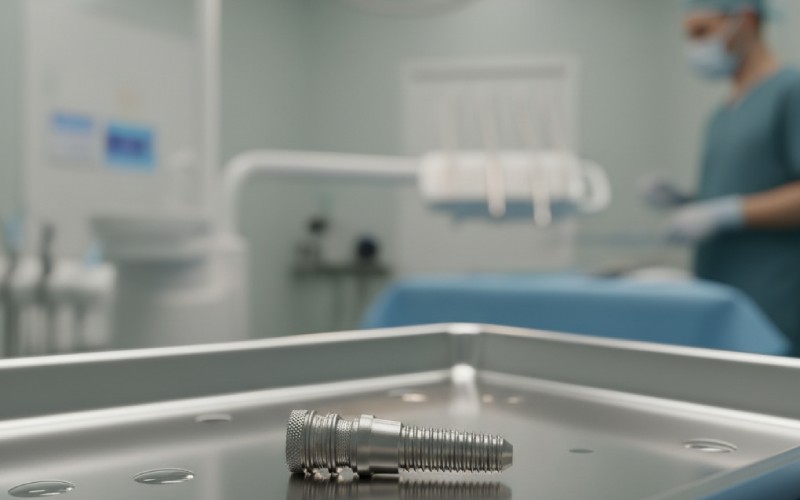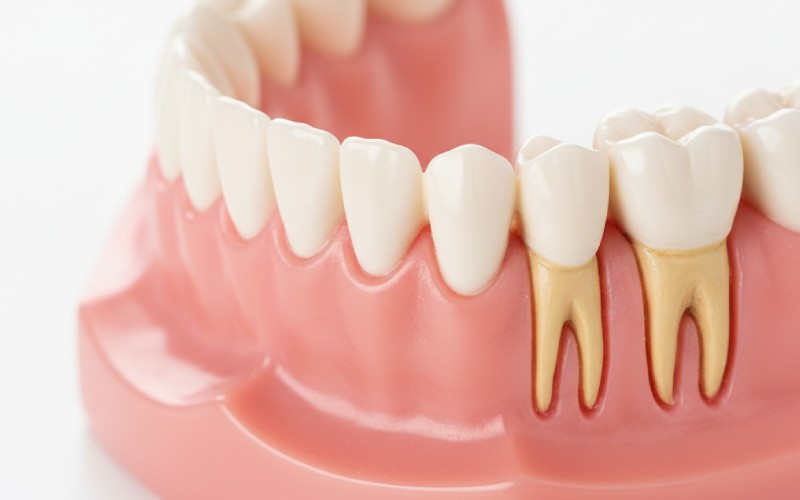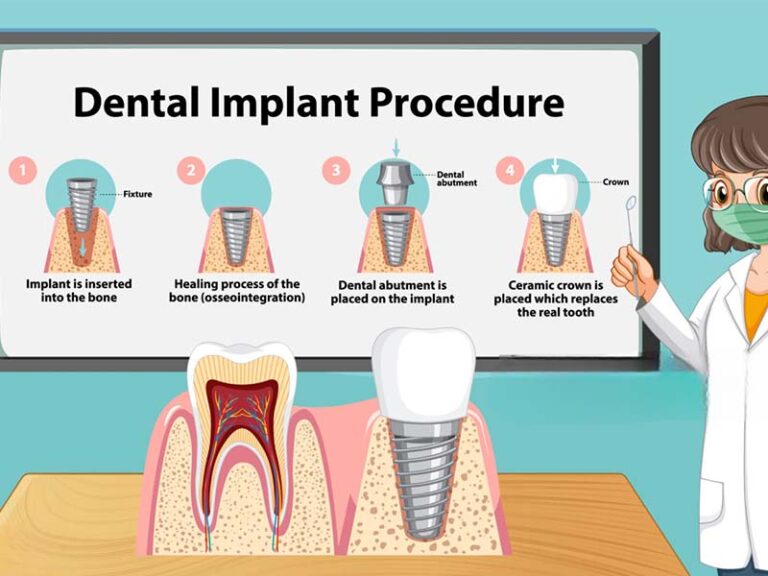
Can Periodontal Disease Stop You From Getting a Dental Implant?
Do you have teeth that are missing? Do you also have periodontal disease? You might be worried that this disease will keep you from getting a dental implant. This is a worry that many people have. But there is good news. In a lot of cases, you can still get a dental implant and get your great smile back. This article will tell you how.
Read this to find out about periodontal disease. You will learn how it can affect your choice to get a dental implant. We will show you the steps you need to follow. We will give you answers to your questions. You will learn how to make your mouth healthy once more. This is the first thing to do to get a beautiful new smile with a dental implant. Make an appointment with your dentist to get started on your path.
Table of Contents
What Is Periodontal Disease, Really?
Periodontal disease is a very serious infection in your gums. A lot of people just call it gum disease. This disease hurts the soft parts of your mouth, like your gums. If you do not get it treated, it can break down the bone that holds your tooth in place. This is a big reason why grown-ups lose their teeth. The disease begins with something called plaque. Plaque is a sticky, clear film made of germs that grows on your tooth.
This disease has different stages. The first stage is called gingivitis. This is when your gums get red and puffy. Your gums might bleed when you brush them. This is a common sign. The good news is you can fix this early disease. You just need to have good oral hygiene. But if it gets worse, it turns into periodontal disease. This worse disease is a much bigger problem. This disease can make your tooth feel loose or even make it fall out. It is a long-term problem. It needs care from a dentist.
Why Is This Gum Disease a Problem for a Dental Implant?
A dental implant needs a strong base to sit in. The implant is a tiny screw. It is usually made from titanium. During a surgery, a dentist puts it into your jawbone. This small screw works just like the root of a real tooth. For the dental implant to be strong, it has to join with your jawbone. This step is what makes a dental implant so strong and steady.
Periodontal disease attacks the one thing a dental implant must have: a healthy jawbone. This gum disease is an infection that eats away at your gum tissue and bone. If you have gum disease that is active, your jawbone might be too weak to hold a dental implant. Putting a dental implant into a weak jawbone is very risky. The implant would probably not work. The germs from the disease can also move to the spot around the new dental implant. This is why it is very important to treat the disease first.

Can I Get a Dental Implant If My Periodontal Disease Is Active?
The quick and easy answer is no. You cannot get a dental implant if you have a gum disease infection right now. A good dentist will not do the surgery in a mouth that has active periodontal disease. It would be like trying to build a new house on a weak and shaky base. The chance of failure is just too high. The infection has to be treated before anything else.
The main goal is to stop the disease from causing more harm. We have to make your mouth a healthy place for your new dental implant. As soon as the periodontal disease is managed and your gums are healthy, you can take the next step. So, you can’t have the surgery while the infection is active. But having the disease does not mean you can never get a dental implant. It just means you have to take an important first step. Your mouth’s health is the most important thing.
What Kind of Treatment Do I Need Before a Dental Implant Surgery?
Before you can even start to think about dental implant surgery, your dentist has to treat the periodontal disease. The kind of treatment you will need depends on how bad the disease is. For a lot of people, a deep cleaning is the first step. This is not like a normal teeth cleaning. It is a special treatment to clean under your gumline. It gets rid of the plaque and hard tartar that cause the disease.
If the disease is worse, you might need more help. At times, a dentist might suggest a surgery to fix the harm done to your gum tissue. If a lot of bone has been lost, a bone graft might be what you need. A bone graft is a step where a dentist adds bone material to your jawbone. This makes the jawbone stronger so it can hold a dental implant. Your dentist will create a treatment plan that is just right for you. You must follow this plan to become a good person for a dental implant.
How Does the Dental Implant Process Work After My Gum Treatment?
After your gum disease has been treated and your mouth is in good health, you can begin the dental implant process. This is usually a process with many steps. First, the dentist will do the surgery to put the dental implant into your jawbone. This will be the base for your new tooth. This surgery is a very common treatment in cosmetic dentistry.
After the surgery, your jawbone will need some time. It has to heal and grow around the dental implant. This can take a few months to happen. This healing time is what makes the dental implant so strong. Once the implant is steady, your dentist will add a small connecting piece. To finish, they will put a new crown on top that was made just for you. This crown is your new tooth. It will be made to look like your other natural teeth. What you get is a strong, steady tooth that looks and feels like a real one. Getting a dental implant is a great fix for missing teeth.
What Is Peri-Implantitis and How Is It Like Periodontal Disease?
Even after you have a new dental implant, you still have to take good care of your gums. There is a disease that is a lot like periodontal disease, and it can harm a dental implant. This disease is known as peri-implantitis. It is an infection that hurts the gum and bone that are around a dental implant. The very same germs that lead to periodontal disease can also lead to peri-implantitis.
If you had gum disease in the past, you have a bigger chance of getting this new disease. The signs are much the same. You might notice your gums are red and puffy, or they might bleed around the dental implant. If it is not treated, peri-implantitis can make the bone around the dental implant waste away. This can cause the dental implant to become loose and may lead to its failure. This shows why daily care and seeing your dentist for regular checkups are so important. You can stop this disease from happening.

How Can I Make Sure My New Dental Implant Care Goes Well?
Taking good care of your dental implant is how you make it last for your whole life. The job is not done right after the surgery. You must practice very good oral hygiene. This means you have to brush your teeth two times a day. You also have to floss every single day. It is very important to floss around a dental implant. This will get rid of plaque from the area where the gum and tooth meet.
You also have to see your dentist for regular appointments and cleanings. Your dentist will look at the health of your dental implant and your gums. They will check to make sure there are no signs of a disease like peri-implantitis. If you had periodontal disease before, your dentist might suggest that you visit more often. When you follow what your dentist tells you, it will help you protect the money you spent and your new smile. Good daily care will stop this disease from coming back.
Are You a Good Person for a Dental Implant Even with Past Disease?
Yes, you can still be a good person for a dental implant, even if you have had periodontal disease before. The most important thing is that the disease is under control now. Your dentist will look at your mouth to make sure the infection is gone and your gums are in good health.
Here is a list of what makes someone a good person for this:
- Treated Gum Disease: Your periodontal disease has been treated and is now gone.
- Enough Jawbone: You have enough healthy bone in your jaw to hold the dental implant. If you do not, a bone graft might be a choice for you.
- Good General Health: You are healthy in general. Some health problems can make healing harder.
- You Do Not Smoke: Smoking can raise the chance of dental implant failure. It can also make gum disease worse.
- A Promise to Oral Hygiene: You are willing and ready to take excellent care of your new dental implant and your natural teeth.
Your dentist can tell you if a dental implant is the best choice for you. This will happen after they give you a full check-up at your appointment.
What Is the First Step to a Healthier Smile with a Dental Implant?
The very first step is an easy one: make an appointment to see your dentist. You will not know what your choices are until an expert looks at your teeth and gums. When you are at your appointment, the dentist will do a full check-up. They will look for any signs of gum disease and see how much harm has been done.
At this first visit, you can ask any questions you have. The dentist will tell you about the treatment you need to get your gums healthy. They will talk with you about the dental implant process. They will make a special plan just for you to help you get a healthy, full smile. Do not let being scared or worried stop you. Making that appointment is the biggest step you can take to make your mouth’s health better and get a dental implant.
Why Pick a Dental Implant Instead of Other Cosmetic Dentistry Choices?
When you have teeth that are missing, you have a few choices. But a dental implant is usually the best choice for a lot of reasons. It is the newest and best fix in modern cosmetic dentistry. A dental implant is the only choice that replaces the tooth and also its root. This is important because it helps keep your jawbone safe and strong.
Here is a simple chart to see how a dental implant compares to other choices:
| What It Is Like | Dental Implant | Dental Bridge | Dentures |
|---|---|---|---|
| How It Looks & Feels | Just like a real tooth | Can look good, but connects to other teeth | Can look fake, might move around |
| Jawbone Health | Keeps the jawbone safe and strong | Does not protect the bone under it | Bone can still get weaker |
| How to Care for It | Brush and floss like a normal tooth | Hard to clean under the bridge part | Must be taken out to be cleaned |
| How Long It Lasts | Can last a lifetime with good care | Lasts 5-15 years for most people | Need to be replaced or changed often |
A dental implant is a solution for a long time that can make your smile and your health much better. It is a good choice to spend money on for your future. Your dentist can help you figure out if a dental implant is the right choice for what you need.
Important Things to Remember
- You cannot get a dental implant if you have active periodontal disease. The gum disease must be taken care of first.
- Periodontal disease is a bad infection. It hurts the gum and bone that a dental implant needs for support.
- Treatments for gum disease, like a deep cleaning or surgery, can get your mouth healthy enough for a dental implant.
- A disease called peri-implantitis can harm a dental implant. So, it is very important to have good oral hygiene after the surgery.
- The first step is always to make an appointment with your dentist. They will give you a full check-up and a plan for treatment.
- A dental implant is usually the best choice for a long time when you need to replace a missing tooth and keep your mouth healthy.








